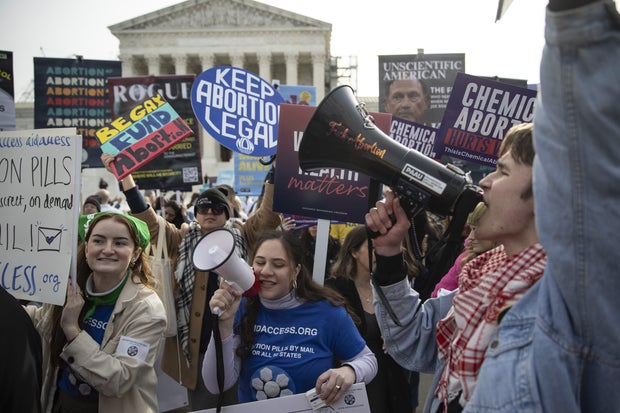Washington – The Supreme Court on Thursday rejected a challenge that sought the availability of a widely used abortion pillpreserving access to medicine in its first major abortion-related decision since the reversal of Roe v..
O unanimous decision of the judges was for procedural reasons. They ruled that a group of anti-abortion doctors and medical associations who brought the lawsuit against the Food and Drug Administration did not have the legal right to do so.
In concluding that they lacked legal standing, the Supreme Court did not address whether the FDA acted legally when it took a series of measures in 2016 and 2021 that relaxed rules for the use of the abortion drug mifepristone.
“Under Article III of the Constitution, a plaintiff’s desire to make a drug less available to others does not establish standing to sue. Nor do plaintiffs’ other standing theories suffice,” Justice Brett Kavanaugh wrote for the court. “Therefore, plaintiffs do not have standing to challenge the FDA’s actions.”
The decision does not rule out other challenges targeting mifepristone, but it does mean that recent FDA measures that have made the drug easier to obtain will remain in effect. These actions included allowing mifepristone to be taken later in pregnancy, expanding the number of healthcare professionals who can prescribe it, and eliminating the requirement for in-person dispensing so the pill can be mailed.
In response to the decision, Abigail Long, spokeswoman for Danco Laboratories, the manufacturer of mifepristone, said the pharmaceutical company is pleased with the decision.
“By rejecting the Fifth Circuit’s radical, unprecedented and untenable interpretation of who has standing to sue, the justices reaffirmed long-standing basic principles of administrative law,” Long said in a statement. “In doing so, they maintained the stability of the FDA’s drug approval process, which is based on the agency’s expertise and which U.S. patients, health care providers and the pharmaceutical industry trust.”
The Supreme Court Abortion Pill Case
Mostafa Bassim/Anadolu via Getty Images
The dispute brought by a group of doctors and medical associations defending abortion rights was the first involving abortion that the Supreme Court has heard following its blockbuster decision that overturned Roe two years ago.
If the opponents had won, the ruling would have restricted access to mifepristone across the country, even in states where abortion is legal.
Mifepristone is taken with a second medicine, misoprostol, to end an early pregnancy. Since it was first approved by the FDA in 2000, mifepristone has been taken by more than 5 million patients, and serious adverse events resulting from mifepristone use are “extremely rare,” according to the agency. Medication abortions accounted for more than half of all abortions in the U.S. healthcare system in 2023, according to a study by the Guttmacher Institute, a pro-abortion research group.
But anti-abortion doctors alleged in a lawsuit filed in November 2022 that the FDA did not have the authority to approve the sale of mifepristone in the US and did not adequately consider the drug’s safety and effectiveness. The lawsuit took aim at the FDA’s approval of mifepristone in 2000 and the steps the agency took in 2016 and 2021 to make it more affordable.
According to these changes, mifepristone can be taken up to 10 weeks of pregnancy, instead of seven weeks; the number of required in-person visits was reduced from three to one; more health care providers could prescribe the medicine; and can be sent by mail.
U.S. District Judge Matthew Kacsmaryk blocked FDA approval in 2000 of the drug and his more recent actions, concluding that they were probably illegal. If left intact, the decision would have removed mifepristone from the market. But the Supreme Court is over maintained access to the drug while the legal process continued. A federal appeals court then scaled back Kacsmaryk’s ruling, upholding the agency’s green light for the sale of mifepristone, but concluding that the agency likely violated the law with its 2016 and 2021 changes.
That decision, by the U.S. Court of Appeals for the 5th Circuit, was overturned by the Supreme Court’s previous order protecting the widespread availability of the abortion drug. But the judges’ decision now dissolves this suspension.
Although the case involved access to a key drug used in medical abortions, drug companies and former FDA officials warned that a ruling against the pharmaceutical agency would go beyond the context of abortion. Pharmaceutical companies said an adverse ruling would undermine the FDA’s approval process for new drugs and open the door to a series of lawsuits challenging decisions made about drugs that have been on the market for years.
Since the Supreme Court repealed the constitutional right to abortion, 14 states have imposed near-total bans with limited exceptions, while seven others ban the procedure at or before 18 weeks of gestation. Fifteen states restrict access to medication abortion, requiring it to be provided by a doctor, according to the Guttmacher Institute.
The Biden administration has taken a series of steps to expand access to medication abortion since Roe was overturned. The FDA in early 2023 finalized a rule allow more retail pharmacies to distribute abortion pills as long as they complete a certification process. CVS and Walgreens, the country’s two largest pharmacy chains, have been certified to sell the drug, paving the way for start selling medicines.
But abortion rights groups and lawmakers have mounted counter-efforts to restrict access to mifepristone. Louisiana Governor Jeff Landry, a Republican, signed legislation in May, which reclassified mifepristone and misoprostol as controlled substances and placed them in the same category as opioids, depressants and others that can cause addiction.
gshow ao vivo
email uol pro
melhor conteudo
mãe png
cadena 3
tudo sobre
absol
























